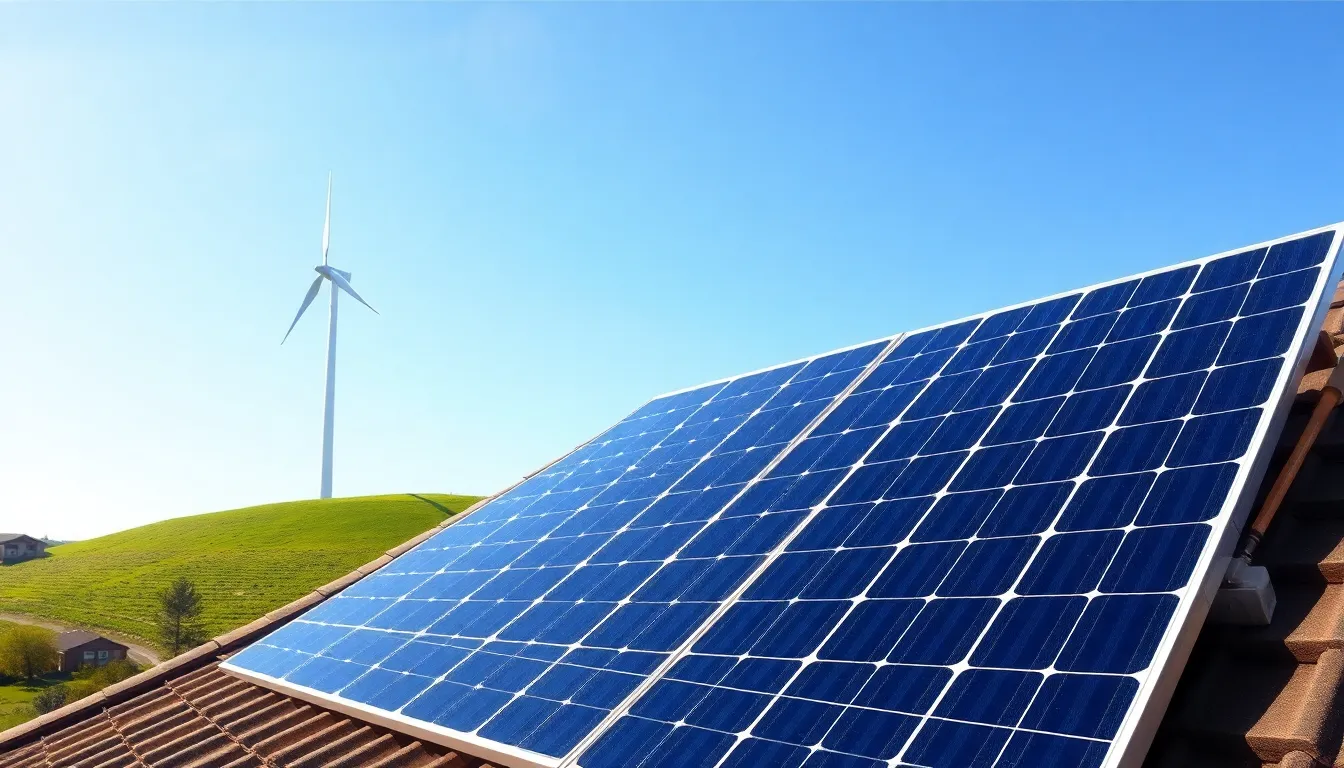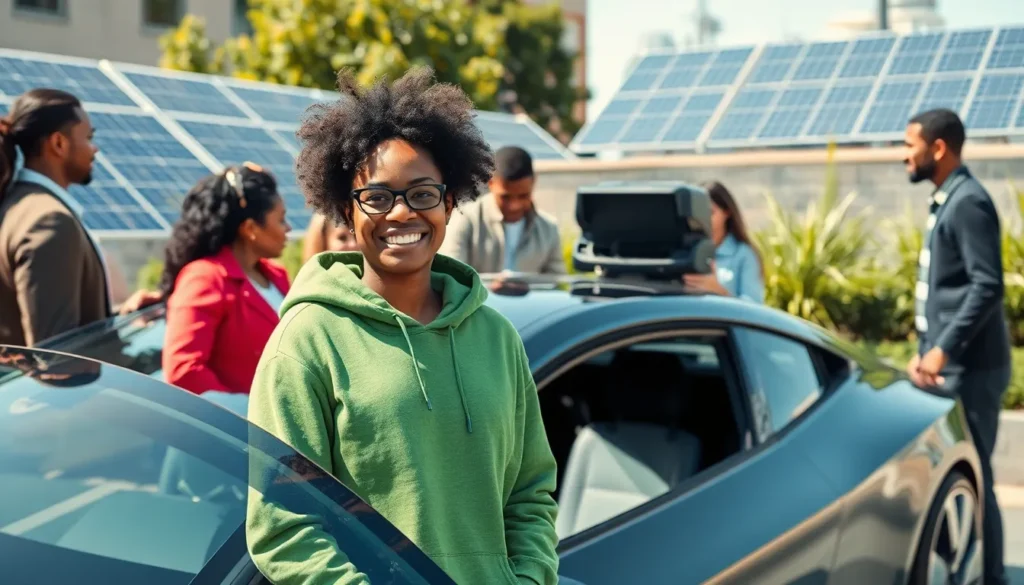In a world where climate change feels like that annoying coworker who just won’t stop talking, green technology advances are stepping up to save the day. From solar panels that double as art to electric cars that make you feel like you’re driving the future, innovation is turning eco-friendly dreams into reality.
Imagine a world where your gadgets not only entertain you but also help the planet breathe a little easier. With cutting-edge solutions popping up faster than a cat meme on the internet, it’s time to dive into the exciting realm of green technology. Buckle up as we explore the latest breakthroughs that are making sustainability not just a buzzword but a way of life.
Table of Contents
ToggleOverview of Green Technology Advances
Green technology has seen significant progress, marked by innovative solutions aimed at combating climate change. Various sectors are adopting advancements to promote sustainability and environmental preservation.
Solar panels now come in artistic designs, integrating aesthetics with functionality. These panels generate clean energy while enhancing architectural appeal. Electric vehicles (EVs) have evolved substantially, featuring improved battery life and charging efficiency. Many manufacturers focus on making EVs more accessible and practical for everyday use.
Wind energy technology has also advanced. Turbines have become more efficient and quieter, capturing more energy from lower wind speeds. Enhanced turbine designs lead to lower costs and higher energy yields.
Smart energy systems play a crucial role in managing energy consumption. These systems use artificial intelligence and IoT to optimize energy use in homes and businesses. By doing so, they reduce waste and lower overall energy costs.
Sustainable agriculture practices are gaining ground, utilizing technology to minimize environmental impact. Precision farming techniques enable farmers to use resources such as water and fertilizers more efficiently. Techniques like vertical farming and hydroponics help maximize yield while reducing land use.
Building materials are evolving, with options like recycled plastics and bamboo gaining popularity. These materials contribute to lower carbon footprints in construction. Energy-efficient designs in buildings, such as passive solar and green roofs, enhance sustainability efforts.
Overall, these advances in green technology demonstrate a growing commitment to fostering a sustainable lifestyle. Innovations empower individuals and organizations to make responsible choices, driving a collective effort toward a healthier planet.
Renewable Energy Innovations

Renewable energy innovations represent significant breakthroughs in addressing climate change and enhancing sustainability. Key advancements in solar and wind energy demonstrate promising potential for a cleaner future.
Solar Power Developments
Solar technology has transformed with the introduction of high-efficiency photovoltaic cells. These cells capture more sunlight, converting it into usable energy efficiently. Innovative designs have led to the creation of solar panels that integrate seamlessly into buildings, boosting aesthetic appeal while generating power. The rise of solar storage solutions enables users to store excess energy for later use, maximizing efficiency. Additionally, transparent solar panels allow for energy generation without obstructing views, incorporating functionality into everyday environments.
Wind Energy Enhancements
Wind energy technology has made strides through the development of larger and quieter turbines. These advancements target low-wind sites, increasing energy capture efficiency. Enhanced materials and design have improved turbine durability, reducing maintenance costs. Offshore wind farms are emerging as a viable option, harnessing stronger wind resources over open waters. Intelligent grid systems are optimizing wind energy distribution, ensuring a reliable supply to meet demand. Collectively, these enhancements position wind energy as a critical component of the global renewable energy landscape.
Sustainable Transportation Solutions
Sustainable transportation solutions play a crucial role in reducing carbon footprints and promoting eco-friendly practices. Innovations in this sector enhance mobility while addressing environmental concerns.
Electric Vehicles
Electric vehicles (EVs) have made significant strides in efficiency and accessibility. With advancements in battery technology, many models now offer ranges exceeding 300 miles on a single charge. Moreover, charging infrastructure is expanding, with over 100,000 public charging stations across the United States. They also contribute to lower operating costs, often translating to savings of up to $1,000 per year compared to traditional gasoline vehicles. Leading manufacturers continue to develop more affordable EV options, making sustainable choices available to a broader audience.
Public Transit Improvements
Public transit systems are evolving to become more sustainable and efficient. Many cities are investing in electric buses and trains, reducing reliance on fossil fuels. Implementation of smart technologies enables optimized routing, decreasing wait times for passengers. Statistics show that electric buses can lower greenhouse gas emissions by up to 70% compared to diesel counterparts. Cities that prioritize public transit enhancements witness increased ridership, resulting in less congestion and cleaner air. Innovations like dedicated bus lanes and real-time tracking apps significantly improve commuter experiences, making public transportation a more attractive alternative.
Green Building Technologies
Green building technologies focus on methods and materials that enhance sustainability and efficiency in construction and design.
Energy-Efficient Materials
Innovations in energy-efficient materials continue to transform the construction landscape. Advanced insulation materials significantly reduce energy consumption in buildings, leading to lower heating and cooling expenses. Sustainable alternatives, like bamboo and recycled steel, are gaining popularity due to their minimal environmental impact. Furthermore, low-VOC paints and finishes improve indoor air quality while reducing harmful emissions. High-performance windows and roofing materials maximize natural light and energy retention, contributing to climate-responsive architecture. According to the U.S. Department of Energy, energy-efficient buildings can use up to 30% less energy than traditional buildings, showcasing the importance of these materials in sustainable design.
Smart Home Innovations
Smart home innovations revolutionize how residents manage energy usage and enhance overall efficiency. Automated systems, including smart thermostats and lighting, allow users to optimize energy consumption according to their schedules. Devices equipped with artificial intelligence learn occupants’ habits and adjust settings to conserve energy further. In addition, energy monitoring tools provide real-time data on energy usage, empowering homeowners to make informed decisions about their consumption. Integration with renewable energy sources, such as solar panels, increases the sustainability of these systems. Research indicates that smart homes can save up to 20% on annual energy costs, making them an invaluable investment for environmentally conscious homeowners.
Waste Management and Recycling
Innovative waste management and recycling technologies play a crucial role in advancing green technology. Emerging systems emphasize efficiency, helping divert significant amounts of waste from landfills. Smart sorting technologies utilize artificial intelligence to enhance recycling accuracy. These systems can identify materials rapidly, significantly increasing the recovery rates of recyclables.
Composting has gained traction as a valuable method for organic waste reduction, contributing to a circular economy. Many urban areas now implement community composting initiatives, allowing residents to contribute to sustainable waste practices. With these programs, organic waste can transform into nutrient-rich soil, supporting local agriculture.
Advanced recycling processes, such as chemical recycling, enable the breaking down of plastics into their fundamental components. This technique allows for higher-quality recycled materials, reducing dependence on virgin resources. Additionally, companies such as Coca-Cola and Unilever are committing to achieving 100% recyclable or reusable packaging by 2025, reflecting a broader shift in corporate responsibility.
Waste-to-energy technologies convert non-recyclable waste into usable energy, minimizing environmental impact. Such facilities not only generate power but also reduce landfill waste by approximately 90%. Implementing these technologies can yield substantial energy savings while addressing waste disposal challenges.
Public awareness campaigns raise understanding of recycling’s importance, influencing behavioral changes that support sustainable practices. Educational programs in schools focus on proper recycling techniques, fostering a culture of environmental stewardship among youth. By prioritizing these initiatives, communities can enhance participation in recycling programs.
Advancements in waste management and recycling highlight the significance of innovative technologies in driving sustainable practices. Emphasis on education, community involvement, and corporate responsibility fuels progress in effective waste solutions.
The strides made in green technology signal a pivotal shift towards a more sustainable future. As innovations continue to emerge across various sectors, individuals and businesses alike are empowered to adopt eco-friendly practices. From artistic solar panels to advanced electric vehicles, these technologies not only enhance efficiency but also redefine how society interacts with the environment.
Embracing these advancements is essential for addressing climate change and fostering a culture of sustainability. By prioritizing green solutions, everyone can contribute to a healthier planet. The journey towards sustainability is just beginning, and the possibilities are limitless.




